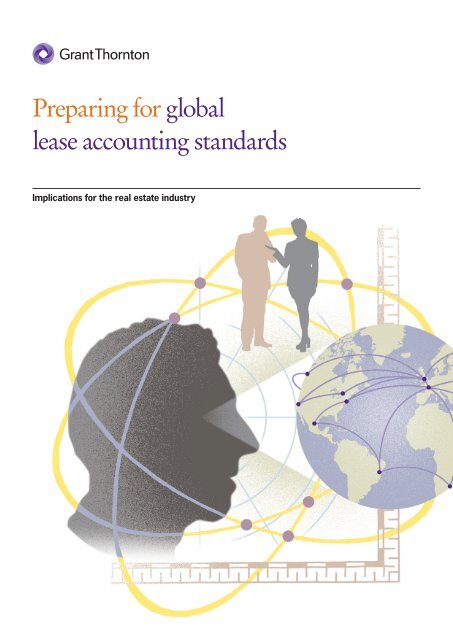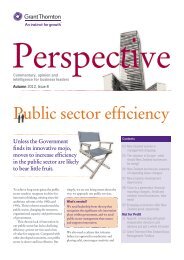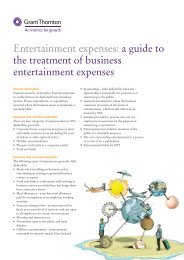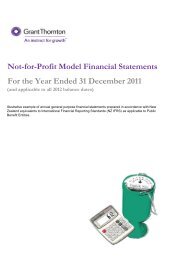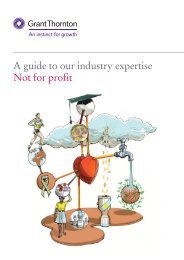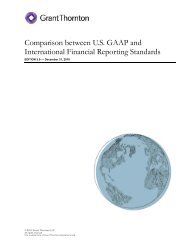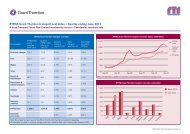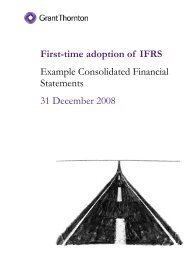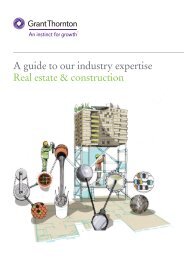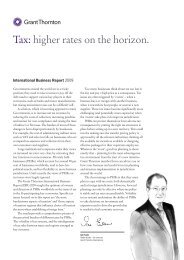Preparing for global lease accounting standards - Grant Thornton ...
Preparing for global lease accounting standards - Grant Thornton ...
Preparing for global lease accounting standards - Grant Thornton ...
You also want an ePaper? Increase the reach of your titles
YUMPU automatically turns print PDFs into web optimized ePapers that Google loves.
<strong>Preparing</strong> <strong>for</strong> <strong>global</strong><br />
<strong>lease</strong> <strong>accounting</strong> <strong>standards</strong><br />
Implications <strong>for</strong> the real estate industry
Introduction<br />
<strong>Preparing</strong> <strong>for</strong> <strong>global</strong><br />
<strong>lease</strong> <strong>accounting</strong> <strong>standards</strong><br />
examines the status of the<br />
proposed <strong>lease</strong> <strong>accounting</strong><br />
<strong>standards</strong> and offers real<br />
estate executives’ perceptions—<br />
from Australia, Canada,<br />
India, the UK, and the<br />
United States—of the<br />
<strong>standards</strong>’ potential impact.<br />
Real estate companies and other lessor organisations<br />
around the world—and especially their lessees—face the<br />
prospect of fundamental changes in how they account<br />
<strong>for</strong> <strong>lease</strong>s. New <strong>lease</strong> <strong>accounting</strong> <strong>standards</strong> proposed by<br />
the International Accounting Standards Board (IASB)<br />
and the US Financial Accounting Standards Board<br />
(FASB) are expected to become International Financial<br />
Reporting Standards by the end of 2011. They could<br />
create costly process changes <strong>for</strong> some real estate firms<br />
and reshape the <strong>accounting</strong> models of others—and they<br />
have all firms looking <strong>for</strong> potential real estate market<br />
side effects. Reaction within the real estate sector to the<br />
proposed <strong>standards</strong> and initial deliberations has ranged<br />
from annoyance to concern.<br />
Contents<br />
3 Introduction<br />
4 Why the change?<br />
6 Awareness and impact<br />
9 Lease lengths and incentives<br />
11 Real estate prices and demand<br />
12 Buy rather than <strong>lease</strong><br />
13 Working with lenders<br />
14 Concerns and recent<br />
board discussions<br />
16 Preparedness<br />
18 Global contacts<br />
3
Why the change in<br />
<strong>lease</strong> <strong>accounting</strong> <strong>standards</strong>?<br />
The IASB and FASB first published a<br />
discussion paper in March 2009 on<br />
<strong>lease</strong> <strong>accounting</strong> in response to concerns<br />
about the treatment of <strong>lease</strong> contracts<br />
under International Financial Reporting<br />
Standards (IFRS) and US Generally<br />
Accepted Accounting Principles<br />
(GAAP). IASB and FASB noted<br />
that many <strong>lease</strong> contracts at that time<br />
(total contracts worth about US$760<br />
billion in 2007) 1 did not appear on a<br />
statement of financial position/balance<br />
sheet because IFRS and US GAAP<br />
split <strong>lease</strong>s into two categories: finance<br />
<strong>lease</strong>s (capital <strong>lease</strong>s under US GAAP)<br />
recognised in the balance sheet and<br />
operating <strong>lease</strong>s (a lessee simply<br />
recognises <strong>lease</strong> payments as an<br />
expense over the <strong>lease</strong> term).<br />
In August 2010, after an initial<br />
comment period in 2009, the boards<br />
published, <strong>for</strong> public comment,<br />
the Leases Exposure Draft (ED).<br />
That document described the<br />
concerns of IASB and FASB over<br />
current <strong>accounting</strong> approaches.<br />
The existing <strong>accounting</strong> models<br />
<strong>for</strong> <strong>lease</strong>s require lessees to classify<br />
their <strong>lease</strong>s as either finance <strong>lease</strong>s<br />
or operating <strong>lease</strong>s. However, those<br />
models have been criticised <strong>for</strong> failing<br />
to meet the needs of users of financial<br />
statements because they do not<br />
provide a faithful representation<br />
of leasing transactions. In particular<br />
they omit relevant in<strong>for</strong>mation about<br />
rights and obligations that meet the<br />
definitions of assets and liabilities in<br />
the boards’ conceptual framework.<br />
The models also lead to a lack of<br />
comparability and undue complexity<br />
because of the sharp ‘bright-line’<br />
distinction between finance <strong>lease</strong>s<br />
and operating <strong>lease</strong>s. As a result, many<br />
users of financial statements adjust<br />
the amounts presented in the statement<br />
of financial position to reflect the<br />
assets and liabilities arising from<br />
operating <strong>lease</strong>s. 2<br />
The ED proposed an approach to<br />
<strong>lease</strong> <strong>accounting</strong> based on the principle<br />
that all <strong>lease</strong>s give rise to liabilities <strong>for</strong><br />
future rental payments and assets (the<br />
right to use the <strong>lease</strong>d asset) that should<br />
be recognised in an entity’s statement<br />
of financial position, ie, requiring<br />
companies to recognise <strong>lease</strong> contracts<br />
as liabilities and assets on their balance<br />
sheets. The proposed approach seeks<br />
to ensure that <strong>lease</strong>s are accounted<br />
<strong>for</strong> consistently across countries,<br />
sectors, and industries. Specifically,<br />
the ED stated:<br />
The exposure draft proposes that<br />
lessees and lessors should apply a<br />
right-of-use model in <strong>accounting</strong> <strong>for</strong> all<br />
<strong>lease</strong>s (including <strong>lease</strong>s of right-of-use<br />
assets in a sub<strong>lease</strong>) other than <strong>lease</strong>s of<br />
biological and intangible assets, <strong>lease</strong>s to<br />
explore <strong>for</strong> or use natural resources, and<br />
<strong>lease</strong>s of some investment properties.<br />
For <strong>lease</strong>s within the scope of the draft<br />
IFRS, this means that:<br />
(a) a lessee would recognise an asset<br />
representing its right to use the <strong>lease</strong>d<br />
(‘underlying’) asset <strong>for</strong> the <strong>lease</strong><br />
term (the ‘right-of-use’ asset) and<br />
a liability to make <strong>lease</strong> payments.<br />
The proposed approach<br />
seeks to ensure that<br />
<strong>lease</strong>s are accounted<br />
<strong>for</strong> consistently across<br />
countries, sectors<br />
and industries.<br />
(b) a lessor would recognise an<br />
asset representing its right to receive<br />
<strong>lease</strong> payments and, depending<br />
on its exposure to risks or benefits<br />
associated with the underlying<br />
asset, would either:<br />
(i) recognise a <strong>lease</strong> liability<br />
while continuing to recognise the<br />
underlying asset (a per<strong>for</strong>mance<br />
obligation approach); or<br />
(ii) derecognise the rights in<br />
the underlying asset that it<br />
transfers to the lessee and<br />
continue to recognise a residual<br />
asset representing its rights<br />
to the underlying asset at<br />
the end of the <strong>lease</strong> term<br />
(a derecognition approach). 3<br />
The comment period <strong>for</strong> the 66-page<br />
ED ended on December 15, 2010.<br />
The two boards held public roundtable<br />
meetings in December 2010 and<br />
January 2011 to discuss the ED;<br />
in addition, the boards reviewed more<br />
than 700 comments on the <strong>standards</strong><br />
and analysed a range of issues, while<br />
continuing an outreach programme<br />
seeking input from lessors, lessees,<br />
investors, <strong>accounting</strong> firms and other<br />
interested parties. Discussion by<br />
the boards have focused on areas of<br />
concern (see Concerns and recent<br />
board discussions). The boards initially<br />
intended to publish final <strong>standards</strong> by<br />
June 2011, but in April reported an<br />
1<br />
World Leasing Yearbook, 2009.<br />
2<br />
Leases, Exposure Draft, IFRS Foundation, August 2010.<br />
3<br />
Ibid.<br />
extension of the timetable of<br />
a few additional months.<br />
Accounting and/or business<br />
changes are likely <strong>for</strong> many real<br />
estate companies, but the extent of<br />
changes and their timing are difficult<br />
to pinpoint given boards’ extended<br />
timetable and ongoing redeliberations—<br />
ie, the proposed <strong>standards</strong> remain a<br />
moving target. (Note that executives<br />
quoted in this report based their<br />
comments on the ED and public<br />
reports on the proposed <strong>lease</strong><br />
<strong>accounting</strong> <strong>standards</strong> as known<br />
prior to April 2011.)<br />
4 5
Awareness and impact<br />
to individual businesses<br />
One thing is clear in speaking with<br />
lessors from around the world and<br />
reviewing <strong>for</strong>mal comments offered<br />
to the boards: most lessors are<br />
following the issue closely, with an<br />
understanding of the proposed <strong>lease</strong><br />
<strong>accounting</strong> <strong>standards</strong>. Opinions<br />
regarding the <strong>standards</strong>’ impact vary<br />
considerably as many lessors do not<br />
see a direct impact on their businesses<br />
but rather see impact <strong>for</strong> their markets.<br />
In addition, many real estate firms will<br />
not see significant <strong>accounting</strong> revisions<br />
due to exclusions expected in the final<br />
<strong>standards</strong>:<br />
• investment property: The IASB<br />
has proposed to exclude investment<br />
properties measured at fair value<br />
(in accordance with IAS 40) from<br />
the <strong>lease</strong> <strong>accounting</strong> requirements<br />
• national GAAP: in much of the<br />
world, unquoted (privately owned)<br />
real estate and other companies<br />
apply national <strong>accounting</strong> rules<br />
rather than IFRS or GAAP.<br />
Those companies’ financial<br />
statements will only be directly<br />
affected if national standard-setters<br />
decide in due course to converge<br />
with the new IASB and FASB<br />
<strong>lease</strong> <strong>accounting</strong> model. Similarly,<br />
the impact on lessees will in<br />
many countries depend on<br />
whether they are quoted<br />
(public) or private entities<br />
• short-term <strong>lease</strong>s: <strong>lease</strong>s of less<br />
than 12 months, such as <strong>for</strong><br />
multifamily housing, would<br />
be excluded.<br />
“We have studied them in detail<br />
since the initial exposure draft and we<br />
have been involved with sector-wide<br />
discussions and held meetings with<br />
relevant IASB members,” noted<br />
Lucinda Bell, executive director,<br />
UK-based British Land Co., which<br />
manages, owns, finances, and<br />
develops commercial property<br />
and has a £9.3 billion portfolio of<br />
prime locations, mainly in the UK.<br />
She also points out that “thoughts<br />
are well advanced <strong>for</strong> real estate<br />
investors that carry their assets at<br />
market value (such as us) to be<br />
exempt from the provisions.”<br />
Warren Persky, group finance<br />
director of Telereal Trillium, one<br />
of the UK’s largest property<br />
companies, with more than 8,000<br />
properties nationwide and a customer<br />
base of private companies, local<br />
authorities, and central government<br />
departments, said he is familiar with<br />
the <strong>standards</strong> “because the various<br />
professional bodies are putting out<br />
circulars saying what it’s about and<br />
what they think the impacts will be.<br />
But, of course, <strong>for</strong> us, it’s still a couple<br />
years away. And there have been threats<br />
about an update to <strong>lease</strong> <strong>accounting</strong><br />
<strong>for</strong> 20 years that have not followed<br />
through.” His company generally<br />
reports under UK GAAP and is<br />
unlikely to see a short-term impact,<br />
he said, but he expects the <strong>standards</strong> to<br />
become relevant if the UK Accounting<br />
Standards Board aligns UK GAAP<br />
with IFRS, which is probable.<br />
Opinions regarding the<br />
<strong>standards</strong>’ impact vary<br />
considerably as many<br />
lessors do not see a direct<br />
impact on their businesses<br />
but rather see impact <strong>for</strong><br />
their markets.<br />
“I think our philosophy has<br />
always been you do the right<br />
thing commercially and actually<br />
not let the <strong>accounting</strong> tail wag<br />
the dog because, you know, you<br />
just look at what’s in the best<br />
long-term commercial interest<br />
of the company.”<br />
Brian Bickell,<br />
Finance Director, Shaftesbury PLC<br />
Terry Bradshaw is executive VP<br />
and chief financial officer of American<br />
Asset Corp. (AAC), a diversified real<br />
estate company based in Charlotte,<br />
N.C., that owns suburban class A<br />
office, large-footprint retail, and<br />
industrial flex space—about 6 million<br />
square feet in the Raleigh and Charlotte<br />
metropolitan statistical areas (MSAs).<br />
Bradshaw said he’s well versed in the<br />
standard, although he did not submit<br />
a comment letter.<br />
“Given that a significant part<br />
of our business is investment in<br />
commercial property, the proposed<br />
changes to the leasing standard have<br />
the potential to see significant changes<br />
to our sector,” said an Australian real<br />
estate executive. “However, from<br />
a reporting perspective, the adoption<br />
of the fair value model means that<br />
as a lessor the measurements and<br />
disclosure requirements of the proposed<br />
changes do not apply to our investment<br />
portfolio.” The executive also noted<br />
that, despite its fair-value approach,<br />
his business is likely to feel some impact<br />
as it incurs costs in updating processes<br />
to capture and monitor the additional<br />
in<strong>for</strong>mation requirements associated<br />
with the new standard, particularly<br />
<strong>for</strong> contracts in which the company<br />
enters <strong>lease</strong>s as the lessee (a small<br />
part of its business).<br />
“Obviously, as a real estate investor,<br />
we’ve been carved out of having to<br />
apply the standard ourselves,” said<br />
Brian Bickell, finance director,<br />
Shaftesbury PLC, a real estate<br />
investment trust focused exclusively<br />
on London’s West End. Shaftesbury’s<br />
portfolio consists of shops and<br />
restaurants (about 70 percent),<br />
offices (20 percent), and residential<br />
(10 percent).<br />
“I suppose the point at which<br />
we became carved out, I probably<br />
[lost] interest in it as it doesn’t affect<br />
us directly but obviously could have<br />
an impact on our tenants,” continued<br />
Bickell. “I think our philosophy has<br />
always been you do the right thing<br />
commercially and actually not let<br />
the <strong>accounting</strong> tail wag the dog<br />
because, you know, you just look<br />
at what’s in the best long-term<br />
commercial interest of the company.”<br />
Howard Garfield is CFO<br />
of Behringer Harvard Multifamily<br />
REIT I Inc., a real estate investment<br />
trust based in Addison, Texas that<br />
acquires a portfolio primarily of<br />
high-quality multifamily communities,<br />
including conventional multifamily<br />
assets, age-restricted residences, and<br />
student housing. Garfield wrote<br />
a comment to the IASB and FASB,<br />
and has been in favour of changes <strong>for</strong><br />
lessees, but “when the scope of it was<br />
expanded to include lessors, I was quite<br />
opposed to it.” He called the lessor<br />
<strong>standards</strong> as proposed in the ED a<br />
“theoretical model” that characterises<br />
real estate as financing. “To call what<br />
real estate owners do as financing is<br />
just absurd. And to think that, now,<br />
people are going to start recognising<br />
interest income and changing their<br />
approach to real estate just shows how<br />
far a theoretical model is from the real<br />
world. This will truly trivialise GAAP,<br />
and we’ll all spend money.”<br />
Even among firms that do have to<br />
address the new <strong>standards</strong>, concern is<br />
primarily focused on costs to comply<br />
and the effects on markets and tenants<br />
6 7
Most believe that the<br />
rigorously detailed<br />
<strong>standards</strong> (as they<br />
currently exist) will at<br />
least achieve a goal of<br />
transparency and make<br />
trying to tilt the playing<br />
field difficult or of<br />
limited value.<br />
rather than on business model changes.<br />
Philip Payne, CEO of Charlotte,<br />
N.C.-based Ginkgo Residential, a real<br />
estate operating company that provides<br />
management <strong>for</strong> 28,500 apartment<br />
homes across the United States,<br />
said he does not expect major impact<br />
“other than significant increase in<br />
<strong>accounting</strong> ef<strong>for</strong>t and cost with<br />
no benefit. [The] proposal will<br />
not result in more accurate or<br />
in<strong>for</strong>mative financials. [It] in fact<br />
may be misleading.”<br />
“I think, long term, just the pure<br />
cost of having to implement something<br />
as complex as this standard in the<br />
type of economic environment<br />
we’re in is un<strong>for</strong>tunate timing,”<br />
said Bradshaw from AAC.<br />
Sandro D’Ercole, VP <strong>accounting</strong>,<br />
Redcliff Realty Management Inc., a<br />
Toronto-based real estate company<br />
providing asset management, property<br />
management, and development services<br />
to private investors and pension funds,<br />
reiterated that comment: “This will lead<br />
to more subjective interpretations of the<br />
financial statements and questions by<br />
our stakeholders.”<br />
Angus Harvey Ross is senior<br />
director at CB Richard Ellis, Brisbane,<br />
Australia, which is a service provider<br />
in the corporate real estate area,<br />
providing advice and services to major<br />
corporations that occupy space<br />
rather than those who invest in the<br />
development of space: “I think it’ll have<br />
a substantial impact in both my business<br />
and in the business of my clients. We’re<br />
already seeing the commencement of<br />
it now. I think we’re probably a little<br />
bit too late in the process, but we’re<br />
starting to see much more emphasis<br />
being brought on to the changes that<br />
will take place and how that will affect<br />
the portfolios and the balance sheet.”<br />
Executives believe there will be<br />
little room to manipulate or develop<br />
<strong>accounting</strong> structures to improve<br />
competitive position or gain advantage<br />
via the <strong>standards</strong>, such as providing<br />
the appearance of enhanced cash flow.<br />
Most believe that the rigorously detailed<br />
<strong>standards</strong> (as they currently exist) will<br />
at least achieve a goal of transparency<br />
and make trying to tilt the playing field<br />
difficult or of limited value.<br />
“There may be opportunity to<br />
structure <strong>lease</strong>s in such a way to give<br />
favourable <strong>accounting</strong> positions<br />
through varying incentives, <strong>lease</strong><br />
structures, or <strong>lease</strong> review profiles,<br />
however we have not fully investigated<br />
these at this time as all outcomes<br />
associated with the new standard are<br />
still not known,” said an Australian<br />
executive. “We expect these opportunities<br />
to be limited as we assume the final<br />
standard will focus on the substance<br />
of the transaction.”<br />
“From what I’ve read of the<br />
standard, it’s fairly well written,”<br />
said Bradshaw. “When I say well<br />
written, [I mean] it doesn’t lend itself<br />
to manipulation very well from what<br />
I can tell. Unlike most of the <strong>standards</strong><br />
we’ve had hereto<strong>for</strong>e in the US, it’s<br />
a principle-based standard and not a<br />
rules-based standard. When you have<br />
a principle-based standard, it’s very<br />
difficult to manipulate the process to<br />
your benefit. So I don’t think there’s<br />
a lot of room, at least in the way the<br />
standard’s written now, <strong>for</strong> landlords to<br />
develop a programme where tenants get<br />
a favourable treatment on their balance<br />
sheet by some structuring mechanism.<br />
Maybe there will be, but I haven’t<br />
seen it yet.”<br />
Sumit Chatterjee, GCFO, Pioneer<br />
Urban, a real estate development firm<br />
headquartered in Gurgaon, India,<br />
near New Delhi, remarked,<br />
“The objective of this standard is<br />
to have a more transparent <strong>accounting</strong><br />
structure. We believe that the<br />
companies in the leasing business<br />
will surely develop a leasing structure<br />
that complies with IAS along with<br />
maintaining cash flows and financial<br />
positions of both lessor and the lessee.”<br />
Lease lengths and incentives<br />
Executives in the real estate sector<br />
are concerned about the effect of<br />
pending <strong>standards</strong> on markets just now<br />
emerging from recession. One concern<br />
is that if <strong>lease</strong>s are accounted <strong>for</strong> by<br />
lessees as liabilities <strong>for</strong> the length of<br />
the <strong>lease</strong>s (and possibly including<br />
options <strong>for</strong> additional years), will<br />
lessees seek shorter-term <strong>lease</strong>s?<br />
And if that occurs, how might it<br />
impact valuation of lessor properties?<br />
Persky argues that companies are<br />
already seeking short <strong>lease</strong>s and earlier<br />
breaks, and that the new <strong>standards</strong> will<br />
put even more pressure on them to<br />
negotiate shorter terms. “We’ve got<br />
existing, very long <strong>lease</strong>s. I don’t know<br />
what’s going to happen next time we<br />
do a major deal. I guess there’ll be<br />
pressure about whether it affects<br />
valuation and how it will affect the<br />
amount of debt that can be raised at<br />
one time on the deal.”<br />
An Australian real estate executive<br />
also anticipated shorter <strong>lease</strong> lengths.<br />
“We believe that in the short term<br />
that covenants will be altered to<br />
accommodate the change, and this<br />
impact on businesses will be highlighted<br />
as a detailed note in the accounts.<br />
The medium- to long-term [time frame]<br />
could lead to shorter <strong>lease</strong> terms or<br />
alternate methods of contracting to<br />
minimise balance-sheet impact.<br />
This would potentially impact our<br />
non-residential business model.”<br />
Others argue that most tenants<br />
need to be able to project their<br />
occupancy costs and want to<br />
minimise <strong>lease</strong> cash costs, which would<br />
mean lessees won’t necessarily seek<br />
shorter <strong>lease</strong> terms. Garfield said,<br />
“If they’re retail, they certainly don’t<br />
want to be exposed to market rifts.<br />
In major shopping centres, those are<br />
typically 10-year <strong>lease</strong>s, and they’re<br />
not going to want to go to two- or<br />
three-year <strong>lease</strong>s and then be exposed<br />
to market conditions just <strong>for</strong> <strong>accounting</strong><br />
issues; same thing with office tenants.”<br />
“Inevitably the likely reaction<br />
will be different <strong>for</strong> different types of<br />
tenants,” said Bell of the UK’s British<br />
Land Co. “Our portfolio is prime, and<br />
we find that the retail occupiers often<br />
want long <strong>lease</strong>s to be assured of having<br />
a unit on a key trading area. There will<br />
be other tenants with a different view.<br />
If <strong>lease</strong>s were to be shorter, the impact<br />
on valuation will be a function of<br />
the market: in a strong market it may<br />
have little impact; in a market craving<br />
certainty, then depending on the level<br />
of the rents, it may be seen as a<br />
disadvantage. However, this standard<br />
has been on the agenda <strong>for</strong> the last<br />
decade and has not significantly altered<br />
tenant behaviour so far.”<br />
“I think sophisticated tenants or<br />
sophisticated lessees will analyse it<br />
correctly and remember why they<br />
wanted a long-term <strong>lease</strong> to start<br />
with,” said Bradshaw. “It’s an inflation<br />
hedge, and so that you can budget<br />
and control your cost. I think that<br />
if [desire <strong>for</strong> short-term <strong>lease</strong>s]<br />
is a phenomenon, I think it’ll be<br />
short-lived, because I don’t<br />
believe most lessees want<br />
significant volatility in their<br />
occupancy costs.”<br />
Harvey Ross of Australia added:<br />
“We’re not seeing people changing<br />
to short-term <strong>lease</strong>s, primarily because<br />
the markets here work on long-term<br />
<strong>lease</strong>s and the benefits and incentives are<br />
<strong>for</strong> long-term <strong>lease</strong>s. So, it’s unlikely that<br />
we’ll see too much short-term work.<br />
The major issue <strong>for</strong> these companies<br />
is that the initial impact, in other words<br />
the data changeover, means that every<br />
<strong>lease</strong> becomes a capital <strong>lease</strong> irrespective<br />
of its [term]. What the auditor is<br />
assigned to look at now is the spread<br />
of the expiry dates over a 10-year period<br />
so that if it’s better now to renegotiate<br />
the <strong>lease</strong>s to get a better spread of<br />
expiries, then we’re renegotiating the<br />
<strong>lease</strong>s prior to the impact of the new<br />
<strong>accounting</strong> <strong>standards</strong>.”<br />
8 9
Real estate prices and demand<br />
A prevalent thought among real<br />
estate executives is that savvy businesses—<br />
lessees or lessors—will continue to do<br />
what is right <strong>for</strong> their businesses and<br />
not let <strong>accounting</strong> dictate their moves.<br />
Nonetheless, there is the potential<br />
that shorter <strong>lease</strong>s will affect the<br />
incentive packages (eg, inducements,<br />
flexibility of terms, tenant improvement<br />
allowances, contingency clauses)<br />
and/or space configurations.<br />
“We are in a marketplace here where<br />
only long-term <strong>lease</strong>s attract any <strong>for</strong>m<br />
of incentive,” said Harvey Ross. “So<br />
anything that happens in the next two to<br />
three years will certainly have an impact<br />
on the likely incentives. I expect that<br />
what will happen is that the companies<br />
will now look at <strong>lease</strong>s, which are<br />
relatively short term—in other words,<br />
<strong>lease</strong>s with expiry dates in two, three,<br />
four, five years’ time—and try and<br />
renegotiate now <strong>for</strong> a longer period so<br />
that they get the benefit of the incentives<br />
now and that can go against any future<br />
costs on the balance sheet.”<br />
Persky agreed: “I think there’ll be a<br />
lot more thinking about all that. I think<br />
there will be changes. I don’t know<br />
what the changes will be. There could<br />
be some irrational behaviours from a<br />
commercial perspective, purely in terms<br />
of <strong>lease</strong>s, because there’ll be some other<br />
commercial imperatives driven from the<br />
numbers, from the <strong>accounting</strong>, a kind<br />
of knock-on effect. So you actually<br />
almost do something that’s potentially<br />
not commercial in order to avoid an<br />
<strong>accounting</strong> impact, because that<br />
<strong>accounting</strong> impact leads to other<br />
knock-on effects. And I think that’s a<br />
bizarre kind of event but a possibility.”<br />
“Being a developer, we have to<br />
plan the projects as per the market<br />
requirement,” pointed out Chatterjee.<br />
“Every <strong>lease</strong> has its own requirement<br />
and will be framed/negotiated separately.<br />
Changing space configuration may not<br />
be the right solution. This has to be<br />
mutually decided between the lessor<br />
and the lessee.”<br />
At AAC, Bradshaw ruled out the<br />
company changing space configurations<br />
due to the new <strong>standards</strong>. “No, I don’t<br />
think it would change our configuration.<br />
We are very much a long-term property<br />
owner. This sounds bad, but we’re going<br />
to build what we think is a long-term<br />
viable asset, and the tenants will come<br />
or they won’t. But I don’t think we’ll<br />
change our footprint or our programme<br />
to fit because of this standard. We do<br />
have assets in our portfolio that lend<br />
themselves well to smaller footprint<br />
spaces, which I think is a good thing to<br />
have, but I don’t see any change in our<br />
programme to accommodate this.”<br />
“I don’t think this will<br />
affect our tenants’ decision<br />
on how long their <strong>lease</strong><br />
will be,” said D’Ercole.<br />
“This decision should be<br />
based on business needs,<br />
not <strong>accounting</strong> treatments.”<br />
A prevalent thought among<br />
real estate executives is<br />
that savvy businesses—<br />
lessees or lessors—will<br />
continue to do what’s right<br />
<strong>for</strong> their businesses and<br />
not let <strong>accounting</strong> dictate<br />
their moves.<br />
Most real estate executives don’t expect<br />
prices to be significantly influenced—<br />
short or long term—by the proposed<br />
<strong>lease</strong> <strong>accounting</strong> <strong>standards</strong>. Nor do they<br />
expect space availability to be affected.<br />
But opinions were mixed on both<br />
issues, and it is difficult to know how<br />
lessees might react amid the current<br />
uncertain economic climate.<br />
“It may have some impact on<br />
the prices in the short term,” said<br />
Chatterjee, “but will not impact the<br />
prices largely in the open market<br />
as we go <strong>for</strong>ward.”<br />
Bickell does not see much of<br />
anything impacting high-end pricing<br />
in Shaftesbury’s portfolio: “I think the<br />
West End of London is a fairly unique<br />
area of real estate. So the fundamental<br />
tension between supply and demand will<br />
create the market. I think outside of the<br />
core of the centre of London, then, yes,<br />
I think it may well have an impact<br />
because I’m sure a lot of people will<br />
be looking at the term of their leasing<br />
commitments and what that’s doing to<br />
their financial reporting and the way<br />
people just generally view their balance<br />
sheet position.”<br />
“We expect the underlying<br />
dynamics of the real estate market<br />
should not change due to these<br />
financial reporting requirements,”<br />
says an Australian executive.<br />
“There may, however, be changes<br />
in how <strong>lease</strong>s are structured to<br />
ensure that any adverse impacts<br />
are mitigated from both a landlord<br />
and tenant perspective. Demand <strong>for</strong><br />
space should continue to be driven<br />
by economic conditions and market<br />
fundamentals, unless we see changes<br />
to property offerings from <strong>lease</strong> to<br />
individual ownership structures.”<br />
“I think that the major impact<br />
that we see is in the first two to three<br />
years following the implementation<br />
of the <strong>standards</strong>,” said Harvey Ross.<br />
“Long term, we believe that the market<br />
will actually just get back to a normal<br />
process and everybody will accept<br />
the terms.”<br />
“If lessees come to the rational<br />
decision that I think they will—<br />
‘We can’t allow this <strong>accounting</strong><br />
standard to dictate our business’—<br />
and they continue to sign <strong>lease</strong>s of<br />
normal term, I think it has very little<br />
impact on value,” said Bradshaw.<br />
“If there is a precipitous move<br />
to short term—true short-term<br />
<strong>lease</strong>s of less than five years—in all<br />
estimations, it’ll destroy the real estate<br />
industry altogether. Anything less<br />
than a five-year <strong>lease</strong> is almost not<br />
underwriteable from a long-term debt<br />
standpoint, so it would have an<br />
incredible impact. I just don’t believe<br />
that will be the outcome.”<br />
“[And] we’re signing <strong>lease</strong>s right<br />
now under the same <strong>lease</strong> terms<br />
we’ve always signed them, normal<br />
five-, even seven-year,” Bradshaw<br />
added. “And that’s the interesting<br />
thing. Even with this looming<br />
standard out there, I’m still seeing<br />
very sophisticated tenants wanting<br />
to sign longer <strong>lease</strong>s than normal.<br />
If five years is the normal, they’re<br />
wanting seven- to 10-year <strong>lease</strong>s,<br />
because they’re afraid of overall<br />
inflation in the marketplace.”<br />
10 11
Buy rather than <strong>lease</strong><br />
Working with lenders<br />
Real estate executives do not believe<br />
the new <strong>standards</strong> will significantly<br />
<strong>for</strong>ce lessees to consider buying space<br />
rather than leasing, saying they will<br />
remember the reasons they are<br />
choosing to be tenants in the first place.<br />
“Generally, lessees will <strong>lease</strong> space<br />
because they will rather put their cash<br />
into their business rather than tying it<br />
up in real estate,” said Redcliff Realty’s<br />
D’Ercole. “They understand their<br />
business, they don’t generally<br />
understand real estate.”<br />
“In the property space, buying<br />
would generally not be an option<br />
available to most tenants due to the<br />
current ownership structure of how<br />
assets are held and traded, which does<br />
not lend itself to the smaller space<br />
requirements of the majority of our<br />
tenants,” said an Australian executive.<br />
“We expect that tenants’ current criteria<br />
will continue to drive decision-making,<br />
such as cash flow, taxation impact<br />
and length of tenure, availability<br />
of suitable space, and flexibility<br />
on expiry of term.”<br />
“Although the impact on tenants’<br />
gearing [ratio of long-term debt<br />
compared to its equity capital] is<br />
broadly the same whether <strong>lease</strong>d or<br />
bought, we see liquidity issues and<br />
operational focus as likely to dictate<br />
tenant behaviour: ie, so leasing is still<br />
attractive,” said Bell. “However, the<br />
balance sheet disclosure benefits of<br />
sale and <strong>lease</strong>-back transactions will<br />
disappear, making them less attractive<br />
to potential tenants going <strong>for</strong>ward.”<br />
From the lessee side, Australia’s<br />
Harvey Ross believes there could be a<br />
trend toward buying. “One of the big<br />
issues that we have here, as I suspect<br />
you have everywhere else, is the lack of<br />
available funds <strong>for</strong> development coming<br />
through the normal banking industry.<br />
One of the opportunities that this offers<br />
the occupiers is the ability to use any<br />
available cash flow or the bank balance<br />
as the funding <strong>for</strong> new developments.<br />
Again, this has a couple of derivatives.<br />
Not only does it mean that the ratio<br />
of <strong>lease</strong>-to-own may well change, it<br />
also means that corporations—major<br />
occupiers—may take short-term profit<br />
out of funding a new development, and<br />
then doing a sale <strong>lease</strong>-back at some<br />
stage beyond the changeover in the<br />
<strong>accounting</strong> <strong>standards</strong>.”<br />
Lenders are gradually becoming aware<br />
of the proposed <strong>lease</strong> <strong>accounting</strong><br />
<strong>standards</strong>, given that the balance sheets<br />
of their clients may change as more<br />
<strong>lease</strong>s become liabilities and assets.<br />
Some lessors have discussed the change<br />
with lenders—including potential<br />
revisions to loan covenants and capital<br />
structures—but there was no consensus<br />
on how lenders would react.<br />
An Australian real estate executive<br />
said that his firm is comparing the issue<br />
to the adoption of IFRS in Australia,<br />
with an emphasis on ongoing dialogue<br />
with financiers, customers, and<br />
investors. “Whilst many existing<br />
covenants either already seek to<br />
include impacts from contracted <strong>lease</strong><br />
arrangements and/or provide <strong>for</strong><br />
adjustments relating to changes in<br />
<strong>accounting</strong> <strong>standards</strong>, there will be<br />
continued discussions with financiers<br />
as the adoption date gets closer and<br />
we have clearer guidance on the final<br />
<strong>for</strong>m of the new standard.”<br />
Behringer Harvard’s Garfield said<br />
he sees, based on the ED, potential <strong>for</strong><br />
significant change with lenders and the<br />
perspective of the industry by lenders:<br />
“Real estate has a conventional view<br />
of how it’s analysed. Revenue and net<br />
operating income are fundamental<br />
characteristics of real estate. If the<br />
exposure draft is incorporated into<br />
literature, that will be dramatically<br />
changed and, in essence, will change<br />
our business model, at least as it’s<br />
reported, from what has traditionally<br />
been a rental perspective to a financial<br />
model, and interest income will be<br />
a dramatic part of that. And as a<br />
consequence of that, the timing of<br />
revenues will be dramatically changed<br />
since now, from a lessor perspective,<br />
it’s now weighted more to the front<br />
end. There’ll be more interest income<br />
in the early years of a <strong>lease</strong> vs. the end.<br />
The incorporation of what we kind of<br />
call the ‘service aspect’—and, again,<br />
per the exposure draft—to have to try<br />
to incorporate that over the life of the<br />
<strong>lease</strong> will dramatically change and, in<br />
my view, distort the true economics<br />
of real estate.”<br />
Telereal’s Persky imagines that<br />
lenders might “read something into”<br />
changes on the balance sheet, with<br />
potential negative impact. He’s also<br />
curious about the effect on financial<br />
institutions themselves. “The banks<br />
are now holding on to lots of property.<br />
And a lot of them have got a little bit<br />
of property, and they <strong>lease</strong> out their<br />
own use properties if they’re a retail<br />
bank. One wonders how that might<br />
be accounted <strong>for</strong>, because banks, more<br />
than anyone, are worried about their<br />
balance sheet.”<br />
“We found the lenders didn’t really<br />
know about the potential standard<br />
or what impact it would have,”<br />
said Bradshaw in the United States.<br />
“So explaining to them the changes it<br />
would make to the balance sheet was<br />
somewhat surprising to them. But they<br />
didn’t have any immediate concern—<br />
at least the lenders we were dealing<br />
with. Of course, we’re a real estate<br />
company, so they have concerns<br />
more now over value of the assets<br />
and things like that than they do<br />
true balance-sheet covenants.”<br />
“We found the lenders<br />
didn’t really know about<br />
the potential standard<br />
or what impact it<br />
would have.”<br />
Terry Bradshaw,<br />
Executive VP and Chief Financial Officer<br />
of American Asset Corp.<br />
12 13
Concerns and recent<br />
board discussions Concern IASB and FASB Considerations<br />
Definition of a <strong>lease</strong>: the boards seek to find a definition that<br />
doesn’t rely on national laws—ie, whether the legal document<br />
is described as a <strong>lease</strong>—in trying to offer a set of requirements<br />
that applies only to <strong>lease</strong>s. Concerns have been expressed that<br />
the ED definition is too broad and would capture too many<br />
service contracts.<br />
The boards are considering whether they should exempt <strong>lease</strong>s<br />
in which the provision of an asset is incidental to providing<br />
a service: eg, limited use of rental equipment as part of<br />
a broader construction contract, rental of set-top boxes<br />
to receive cable TV service, a season ticket or personal seat<br />
licence to a sporting or entertainment venue.<br />
Much of the initial <strong>lease</strong> <strong>accounting</strong> discussions by the IASB<br />
and FASB have dealt with challenges inherent in trying to<br />
enact principle-based rather than rule-based <strong>standards</strong>. Among<br />
the difficulties in developing principle-based <strong>standards</strong> is the<br />
movement away from legal definitions of <strong>lease</strong>s, which exist<br />
within country-specific legal contexts and vary significantly<br />
around the globe. Instead, the IASB and FASB seek to<br />
account <strong>for</strong> the underlying economic effects of <strong>lease</strong>s<br />
and related transactions and contracts. For a majority of<br />
transactions this is relatively clear, but other transactions<br />
require judgement and there<strong>for</strong>e generate more discussion—<br />
and controversy.<br />
Major areas of discussion—concerns expressed by lessors<br />
and lessees—as well as the considerations of the boards, included:<br />
Lessor <strong>accounting</strong>: the lessor <strong>accounting</strong> proposals are not<br />
as well developed as the lessee <strong>accounting</strong> model; concerns<br />
have been expressed that they need more work and field-testing.<br />
Accounting <strong>for</strong> optional renewal periods: many comments<br />
addressed how the ED defines the <strong>lease</strong> term when the contract has<br />
a basic term and a lessee option to prolong the <strong>lease</strong>: the length of<br />
the <strong>lease</strong> term affects the amount of the asset and the liability, both<br />
recognised on the lessee’s balance sheet. The lessee is then required<br />
to identify the longest <strong>lease</strong> term “more likely than not to occur.”<br />
That means that lessees have to predict the outcome of future<br />
extension decisions and possibly include assets and liabilities<br />
<strong>for</strong> unexercised future <strong>lease</strong> renewals.<br />
Contingent rents or variable <strong>lease</strong> payments: the ED proposed<br />
that contingent rentals would require a best estimate of future<br />
payments, such as contracts in which rental is not a fixed amount<br />
but depends on the particular lessee’s revenue from a particular<br />
location. Concerns have been expressed that lessee and lessor<br />
would need to make a best estimate of the outcome of uncertain<br />
future rentals. The amount of that estimate would affect the asset<br />
and liability recognised on the lessee’s balance sheet. That, in<br />
turn, raised concerns about excessive subjectivity and loss of<br />
comparability, given the difficulty of making accurate estimates.<br />
Front-loaded <strong>lease</strong> expense: under IFRS and GAAP operating<br />
<strong>lease</strong> requirements, the lessee normally recognises the same <strong>lease</strong><br />
expense every year <strong>for</strong> each <strong>lease</strong>—“straight-lining.” Under the ED,<br />
however, a <strong>lease</strong> with a fixed annual rental would lead to a higher<br />
expense <strong>for</strong> the lessee in earlier years and a lower expense in latter<br />
years. This effect follows the normal <strong>accounting</strong> treatment <strong>for</strong><br />
non-financial assets and financial liabilities—amortising the asset<br />
straight-line and recognising interest expense based on a constant<br />
yield on the outstanding amount of the liability each year.<br />
This has been identified as a topic requiring more attention.<br />
Although there has been speculation that lessor <strong>accounting</strong> could<br />
be removed from the 2011 version of a new standard, that is an<br />
unlikely scenario. It may be impossible to build a coherent standard<br />
that addresses only one of the two counterparties to a <strong>lease</strong>.<br />
The boards are considering removal of the concept of having<br />
the <strong>lease</strong> term based on “the longest term more likely than not<br />
to occur,” replacing it with a requirement to include option<br />
periods only when the lessee has a clear economic incentive<br />
to extend the <strong>lease</strong>. That would be, <strong>for</strong> example, if the rental<br />
during the extension period was set at a bargain level. In practice,<br />
<strong>for</strong> many commercial <strong>lease</strong>s, the <strong>lease</strong> term (and there<strong>for</strong>e the<br />
asset and liability) would only include the contractual minimum<br />
period and would account <strong>for</strong> extensions as they occur—with no<br />
prediction of unexercised extension options.<br />
The boards appear to be backing away from a best estimate of the<br />
future payments, instead opting to require an estimate of variable<br />
payments only if based on an external index. This condition would<br />
be uncommon, as contingent rents are typically linked to lessees’<br />
revenue from the spaces or usage of the assets (ie, rent increases<br />
the more the asset is actually used). The boards are also seeking<br />
to address so-called “phony” contingent rent clauses, structured<br />
so that all or much of the rental is contractually described as<br />
variable but, in practice, require the lessee to have to pay at least<br />
a base level of rent. The boards are likely to propose that most<br />
contingencies to increase rent are accounted <strong>for</strong> only when the<br />
contingent event actually occurs.<br />
The boards had considered developing a model under which lessees<br />
would classify <strong>lease</strong>s as “finance” or “other-than-finance” <strong>lease</strong>s.<br />
A finance <strong>lease</strong> is a contract in which the lessee’s intention is to<br />
finance long-term use of an asset—in essence, a purchase<br />
by alternate means. Finance <strong>lease</strong>s would be distinguished from<br />
other-than-finance <strong>lease</strong>s using criteria similar to current criteria,<br />
which distinguish on-balance-sheet <strong>lease</strong>s from off-balance-sheet<br />
<strong>lease</strong>s. Both types of <strong>lease</strong> would be “on balance sheet” but<br />
the front-loaded expense effect would arise only <strong>for</strong> the finance<br />
category. However, the latest indications are that the boards<br />
will confirm the single model approach in the ED, along with<br />
the consequential front-loading effect.<br />
14 15
Preparedness<br />
The new <strong>lease</strong> <strong>accounting</strong> <strong>standards</strong> will<br />
require lessors and lessees to adapt their<br />
current business systems and processes<br />
to capture and account <strong>for</strong> <strong>lease</strong> assets<br />
and liabilities. The ease of this transition<br />
will be based on the type of company,<br />
number and type of <strong>lease</strong>s, and the<br />
<strong>accounting</strong> expertise and mechanisms<br />
(internal tracking and in<strong>for</strong>mation<br />
technologies) currently in place. At<br />
a minimum, most executives said the<br />
transition to the new <strong>lease</strong> <strong>accounting</strong><br />
<strong>standards</strong> will add costs, training,<br />
staff time—and aggravation.<br />
“As a real estate company, we<br />
already have to do a lot of analysis<br />
around the overall <strong>lease</strong> term,”<br />
said AAC’s Bradshaw. “The same<br />
spreadsheets we use to straight-line<br />
rental income, which is an existing<br />
requirement under GAAP, those<br />
spreadsheets would lend themselves<br />
to also help with this standard.”<br />
Accounting software already used<br />
in calculating straight-line rents should<br />
lend itself to the proposed <strong>lease</strong><br />
<strong>accounting</strong> standard, he added, but<br />
will require additional ef<strong>for</strong>t. “It’s<br />
going to be a change, and it’s going<br />
to take a lot of work just because of<br />
the sheer number of <strong>lease</strong>s that we<br />
and the industry have to deal with.<br />
But we’re probably more able to at<br />
least understand that concept and deal<br />
with it because it’s not completely<br />
<strong>for</strong>eign to us than would a non-real<br />
estate company. I think they’ve got<br />
major fundamental changes, something<br />
they’ve never looked at be<strong>for</strong>e.”<br />
Bradshaw wondered how large<br />
corporate lessors outside of the real<br />
estate business will deal with the standard.<br />
“I think a lot of those companies are<br />
very worried about that.”<br />
For example, a comment letter<br />
on the ED by Hewlett-Packard states,<br />
“We have 250,000 <strong>lease</strong>s that would<br />
need to be re-evaluated at each<br />
reporting period to determine if there<br />
have been any significant changes<br />
that would require measurement of<br />
<strong>lease</strong>-related assets and liabilities.”<br />
A General Electric respondent wrote<br />
a comment letter, stating, “Given the<br />
number of <strong>lease</strong>s, lessors and lessees<br />
[we] have—and we have well in excess<br />
of 1.8 million <strong>lease</strong> contracts as a<br />
lessor—we believe several years will<br />
be required to make a new <strong>lease</strong><br />
<strong>accounting</strong> standard operational.”<br />
Garfield of Behringer Harvard<br />
said cost and ef<strong>for</strong>t will increase: “I’ve<br />
got the expertise, and I’ve got a staff<br />
of CPAs, so I know we can figure it<br />
out. And … there’s nobody else that’s<br />
expert, so it’s not like I can find people<br />
that have been doing this be<strong>for</strong>e. So I<br />
think my staff can handle it, but [I deal<br />
with multifamily <strong>lease</strong>s], so I’m going<br />
to be affected the least.” But he did not<br />
believe that most existing software<br />
applications <strong>for</strong> the industry are<br />
currently able to handle the necessary<br />
calculations, and says an Excel-based<br />
approach may become impractical due<br />
to the number of <strong>lease</strong>s involved.<br />
He anticipated a boon <strong>for</strong> software<br />
providers. “I think my IT costs will<br />
At a minimum, most<br />
executives said the<br />
transition to the new<br />
<strong>lease</strong> <strong>accounting</strong><br />
<strong>standards</strong> will add<br />
costs, training,<br />
staff time—and<br />
aggravation.<br />
go up, my staffing costs will go up,<br />
my audit costs will go up—and, again,<br />
with no benefit.”<br />
Telereal has large systems <strong>for</strong><br />
managing the flow of in<strong>for</strong>mation<br />
about every one of its properties, said<br />
Persky. “[But] we will have to apply<br />
a lot more sophistication and make it<br />
fit the purpose to help it support our<br />
<strong>accounting</strong> needs as well. It will be a<br />
pain, [but] it’s achievable <strong>for</strong> us. I don’t<br />
know if it will be as easy to do <strong>for</strong> other<br />
organisations… It’ll be costly, and we’ll<br />
have to probably take on a couple of<br />
extra heads to deal with it.”<br />
“To capture, measure, and report<br />
necessary disclosures, our <strong>accounting</strong><br />
systems and procedures will need<br />
to be updated and followed by training<br />
of the finance teams and general<br />
education of the overall business<br />
and tenants,” says an Australian<br />
real estate executive.<br />
“However, we do not expect any<br />
wholesale changes will be required<br />
to our <strong>accounting</strong> systems and<br />
much of the focus will be procedures<br />
to identify transactions and manage<br />
contracts to ensure they are<br />
correctly treated.”<br />
“Given the number of <strong>lease</strong>s,<br />
lessors and lessees [we] have—<br />
and we have well in excess of<br />
1.8 million <strong>lease</strong> contracts as<br />
a lessor—we believe several<br />
years will be required to make<br />
a new <strong>lease</strong> <strong>accounting</strong><br />
standard operational.”<br />
General Electric statement from comment letter on exposure draft<br />
16 17
Global contacts<br />
Clare Hartnell<br />
Global leader, Real Estate<br />
& Construction<br />
T +44 (0) 870 991 2388<br />
E clare.s.hartnell@uk.gt.com<br />
Australia<br />
Sian Sinclair<br />
T +61 (0) 7 3222 0200<br />
E sian.sinclair@au.gt.com<br />
Canada<br />
Bo Mocherniak<br />
T +1 416 366 0100<br />
E bo.mocherniak@ca.gt.com<br />
India<br />
David Jones<br />
T +91 11 4278 7070<br />
E david.jones@in.gt.com<br />
United States of America<br />
Alvin Wade<br />
T +1 312 856 0200<br />
E alvin.wade@us.gt.com<br />
18 19
www.GTI.org<br />
<strong>Grant</strong> <strong>Thornton</strong> International Ltd (<strong>Grant</strong> <strong>Thornton</strong> International)<br />
and the member firms are not a worldwide partnership.<br />
Services are delivered independently by the member firms.


